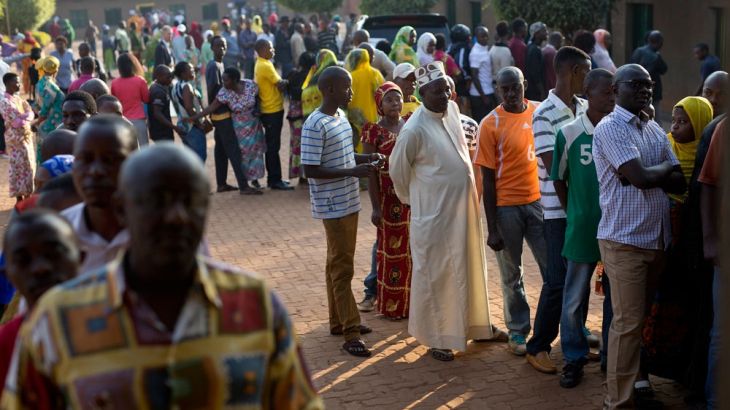Kagame poised for another term as Rwanda polls close
President believed to enjoy widespread popularity but faces allegations of political repression as he seeks third term.

Rwandan President Paul Kagame looked set for a landslide victory as election results trickling in showed the incumbent with an average 98 percent of the vote in districts counted.
The electoral commission released 40 percent of results late on Friday, in which Kagame led his two little-known opponents with a whopping 99.38 percent.
The 59-year-old is expected to easily win a third seven-year term at the helm of the east African nation which he has ruled with an iron fist since the end of the 1994 genocide.
Voting closed at 13:00 GMT on Friday, but many Rwandans who had queued up before the deadline were also allowed to cast their ballots, Al Jazeera’s Malcolm Webb, reporting from Kigali, said.
Kagame has wielded wide-ranging powers since the end of the genocide and became president in 2000.
About seven million people were registered to vote in the polls to pick a president who will lead the country for the next seven years.
According to the Rwanda Electoral Commission, more than 80 percent of registered voters cast their ballots.
Two challengers
Although Kagame is believed to be widely popular, international rights observers have expressed concern over the political environment in which voting took place.
Last month, Amnesty International, the international rights monitor, warned that the elections risked being held under “a climate of fear created by years of repression” due to alleged state intimidation of opposition.
Kagame is facing only two challengers: Frank Habineza from the small Democratic Green Party – the only registered opposition party – and Philippe Mpayimana, a little-known independent candidate and former journalist.
|
|
Habineza told Al Jazeera he expects a clean sweep at the polls.
“Tonight I predict a result of 70 percent in my favour … according to my calcuations that is what I will get if it is a free and fair election,” said Habineza.
“If I don’t get it, I will accept the results provided it is free and fair. We have already struggled with campaigning and some of our supporters have been scared off, but I hope they will vote today.
“If they are scared today then this is unfairness and I cannot accept [the result] … it will be a catastrophe.”
Authorities excluded several independent candidates from running, arguing they did not enjoy enough support.
A 2015 referendum saw 98 per cent of the electorate in favour of changing the constitution to allow Kagame to seek a third term. He could stay in power until 2034.
His Rwandan Patriotic Front (RPF) has governed the country since its armed wing defeated the country’s ruling civilian and military authorities in 1994, ending the genocide of 800,000 Tutsis – Kagame’s ethnic group – and moderate Hutus.
Views of voters
In the capital Kigali, voters arrived at polling stations as early as 5am local time (03:00 GMT) on Friday, two hours before polling began.
Elysee Tuyishima, a 29-year-old university student, said casting his vote in Kimisagara, a low-income suburb in Kigali, was his way of participating in decision making for the country’s future.
“Not every person who is able to lead can do it, but when people meet together through voting they can choose one person who is able to do it,” he told Al Jazeera.
“I hope I have chosen someone who can help my country continue to achieve development.”
READ MORE: Peace Clubs: Rwanda’s post-genocide search for renewal
At some polling stations, traditional and modern songs were played over loudspeakers encouraging people to vote.
In some areas, polling rooms were decorated with balloons, satin cloths and gourds of milk, a symbol of peace and sharing in Rwanda.
Kagame’s perceived popularity rests on Rwanda’s transformation after genocide and civil war into one of Africa’s most stable nations.
He has overseen strong economic growth, at an average of 8 percent between 2001 and 2015, while also turning Rwanda into a technological hub and uprooting corruption.
Repression alleged
Kagame’s critics allege repression – including killings – of the opposition.
Sarah Jackson, deputy director for Amnesty International’s East Africa office, has called on the international community to remain watchful.
“In the immediate run-up to the elections, Rwanda’s international partners with a presence in the country should continue to closely monitor the situation and speak out about any violations they observe,” she said in an email.
The Common Market for Eastern and Southern Africa (COMESA) and the East African Community (EAC) were reported to have sent observers to Friday’s election, the final results of which are expected to be announced within a week.
With additional reporting by Tendai Marima: @i_amten